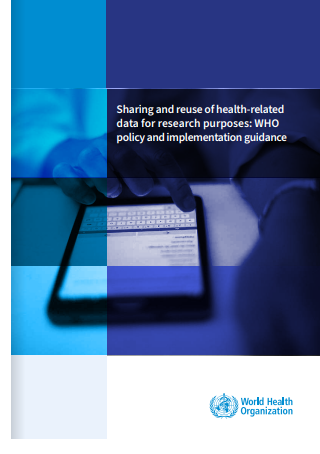TDR has contributed to the development of a new WHO policy and technical guide on sharing health research data.
For more than ten years TDR has been supporting improvements in the dissemination of scientific evidence through its open access policy for research publications and the sharing of the data that underlies them. We have worked with our research communities including those for malaria, TB, schistosomiasis, onchocerciasis and leishmaniasis to create collaborations that maximize the impact of the research data collected to improve safety and implementation of control programmes and effect policy and behaviour.
With its core function to support research capacity, TDR offers clinical research and development fellowships that train researchers on curating, managing and analysing data. TDR has worked with partners such as the Infectious Diseases Data Observatory ( IDDO) to create a governance framework that has enabled the collection and ethical reuse of Ebola patient data.
 Recently TDR has used this experience to contribute to a WHO working group that has developed a new WHO policy and technical guide.
Published in April 2022, Sharing and reuse of health-related data for research purposes: WHO policy and implementation guidance outlines
WHO’s position that sharing research data is a global public good. The policy requires WHO-supported researchers to share data in ways that are equitable, ethical and efficient and follow the technical requirements to ensure the data are findable,
accessible, interoperable and reusable – the FAIR principles.
Recently TDR has used this experience to contribute to a WHO working group that has developed a new WHO policy and technical guide.
Published in April 2022, Sharing and reuse of health-related data for research purposes: WHO policy and implementation guidance outlines
WHO’s position that sharing research data is a global public good. The policy requires WHO-supported researchers to share data in ways that are equitable, ethical and efficient and follow the technical requirements to ensure the data are findable,
accessible, interoperable and reusable – the FAIR principles.
The WHO policy is accompanied by practical guidance to enable researchers to develop and implement a data management and sharing plan, before the research has even started. The guide provides advice on the technical, ethical and legal issues to ensure data, even patient data, can be shared for secondary analysis without compromising personal privacy. This is now a requirement of the research funding awarded by TDR and WHO.
“We have seen the problems caused by the lack of data sharing on COVID-19,” said Dr Soumya Swaminathan, WHO Chief Scientist. “When data related to research activities are shared ethically, equitably and efficiently, there are major gains for science and public health.”
When data related to research activities are shared ethically, equitably and efficiently, there are major gains for science and public health.- Dr Soumya Swaminathan, WHO Chief Scientist
The guide also directs researchers to comprehensive resources. One of the most useful is the free online training on how to share data provided by another TDR partner, the European and Developing Countries Clinical Trials Partnership (EDCTP). This EDCTP Knowledge Hub for data management provides a wealth of good research practice resources, reading material and explanatory videos as well as a search function to identify the best online repository to share your research data. F1000, the publisher that supports the TDR Gateway has also produced this simple overview video to summarize the process of sharing data linked to a publication.
TDR will continue to support its researchers to produce research of the highest quality and we are ready to provide further advice as and when required.
For more information, contact Dr Robert Terry.

